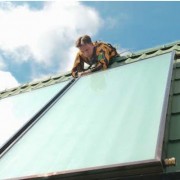Access Equipment Jobs: Plumber
We recently shared information on what it’s like to be a roofer. We’re shining the spotlight on another access equipment job today, giving you a broad introduction to the plumbing industry. Plumbing is one of the most vital jobs around, and it requires a high level of training and skill. Keep reading to find out more.
Specialty Areas and Licensing
There are many areas of plumbing you can specialise in, ranging from roof installations to sub-ground gas lines. The types of plumbing licences available include any combination of water supply, sanitary, and drainage plumbing. In addition to going through a certified education and training program, in order to obtain a license, you will have to pay both an application and license fee. These fees and the exact procedure differ by state, so check with your local governing agency to find out what requirements must be met.
On the Job
Plumbers have to review blueprints and building plans to find existing plumbing and when laying new pipes. This can be tricky when updating older buildings, as building and plumbing codes have changed over time. Plumbers have to be very flexible and ready for surprises on the job. Working as a plumber is an active job that requires critical thinking and math skills.
Plumbers work with a variety of tools, such as pipe saws. Fitting pipes is one major component of the job, as is cutting openings in walls and floors to access the pipes. In addition to hand and power tools, plumbers use everything from cement to clamps to secure pipes. Welding equipment is often used, as are pipe-bending machines and other specialty types of equipment.
‘Green’ Plumbing
Currently, energy efficient systems that are environmentally friendly are in demand. Plumbers are busy installing alternative water sources and reuse systems. Popular new installations include solar thermal water heating systems. These types of systems have different requirements than traditional plumbing equipment. This is still an emerging field of plumbing, and certainly seeking out specialty training in energy efficient plumbing will enhance a plumber’s career.
Access Equipment in Plumbing
A lot of plumbing work takes place on the ground or below ground, but there are plenty of jobs that require plumbers to work on high walls and roofs. As we just mentioned, many homes and business are now being outfitted with solar water heaters. This requires access to the roof, and it may also require a piece of access equipment that can accommodate materials, tools and work space. In this instance, a scissor lift may be the right choice. Force has scissor lifts for hire that range from eight metres to 18 metres and that will suit just about any plumbing job. Plumbers also work on roof drains and downspouts, which boom lifts—cherry pickers—can often access. Some drainage work requires elevated work platforms, too, particularly on city storm drain systems.
There is a variety of access equipment that might be used to suit the diverse work plumbers do, and Force is ready to deliver whatever they need on time and in top-condition.



